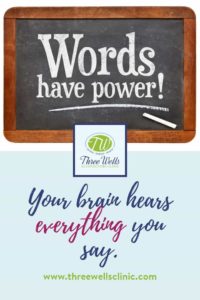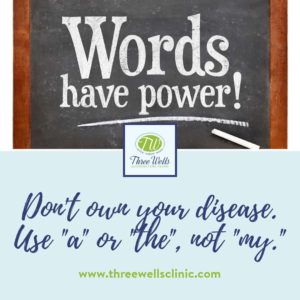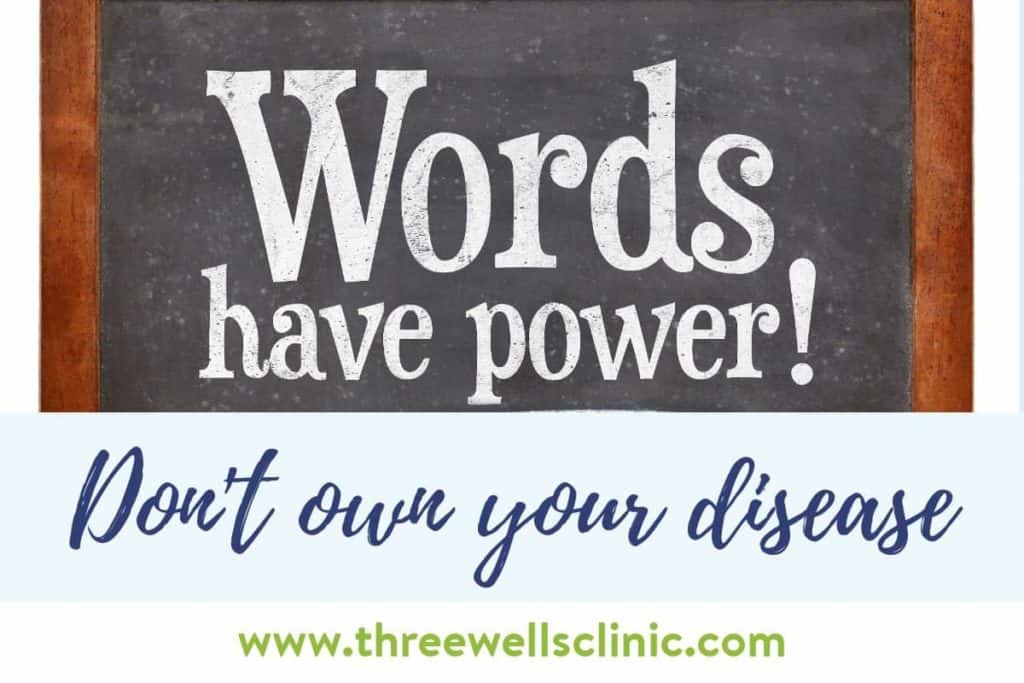Words matter. A lot more than you might think.
If you’ve ever had a treatment with me, we’ve probably talked about the significance of words at one point or another.
Your brain hears everything you say.
Yeah, you might think that’s a silly statement. But think about it some more:
Everything we say either out loud or internally corresponds to a thought in our head ⇒ Every thought triggers an emotion ⇒ Every emotion triggers a physiological reaction somewhere in the body.
So words DO matter.
Don’t own your diagnosis.
Stop using the word “my” for anything you don’t want to keep and stop using “your” when talking to others about their diagnosis.
Instead use “a”, “an”, or “the.”
This applies to a diagnosis, symptoms, conditions, and disease names.
Once I started paying attention to this and really listening to the words my patients use, it’s amazing how often we talk about symptoms like we own them.
“My headaches are killing me.”
“My breast cancer isn’t gone yet.”
“My diabetes is getting worse.”
When using words of possession/ownership like “my”, it makes it easier to create an attachment to that item.
The subconscious mind is powerful.
Think of an iceberg – the conscious brain is the little part showing above the water. This is the part we call our rational, logical mind. It’s this conscious brain we are using when we say things to ourselves in our head.
The subconscious is the enormity of the iceberg below the water. This governs far more of our thoughts and actions than we give it credit.
It is said that the subconscious mind controls about 95% of our brain.
It’s the part that is active when we are on autopilot, like when driving a car, or typing on a keyboard. You no longer have to consciously think about how to turn the steering wheel or where the letter X is located. But this deep part of your brain is using that information and affecting your actions.
The subconscious mind attaches to repetition – good or bad.
The more you repeat something, the more you attach to it.
The more you say “my”, the more you attach to what follows that word.
“My health, my recovery, my progress” – yes! You want these. Keep saying these.
“My lupus symptoms, my breakdown, my relapse” – no! You don’t want these. Switch to “the lupus symptoms, a breakdown, a relapse.”
Why do I care which words you use?
 Notice that I am NOT saying that using the word “My” is the cause of your condition or that every symptom will magically disappear as soon as you start using the word “The”.
Notice that I am NOT saying that using the word “My” is the cause of your condition or that every symptom will magically disappear as soon as you start using the word “The”.
However, symptoms and diseases trigger very powerful emotions in us and I see this all the time with my patients.
Ever heard someone say “the big C” instead of using the word “cancer”? The word itself conveys so much emotion that some people don’t like to even say it.
So when you take an emotionally charged word, and attach “my” to it, you are creating an even stronger subconscious emotional reaction. Which then increases your stress reaction. Which then adds to your challenges in healing.
The benefit of using detachment words is to lessen the fear, anger, and sadness that diagnosis words bring up in us. Even if it helps only a teeny-tiny bit, it’s worth it.
Try this for the next week. Every time you discuss a symptom, no matter how big or small, de-personalize it and see if it changes how you feel in even a small way.
Words matter.
Need more help? Work with me.
This post may contain affiliate links, meaning I may receive a commission (at no extra cost to you) if you use that link to make a purchase. See my disclaimer.
Is Three Wells right for you?
Get a free 15 minute Q&A consultation to find out!
